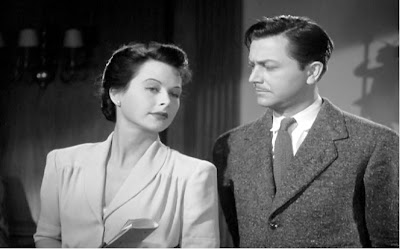Benjamin Franklin once said: “The only sure thing in life in death and taxes.” This quote was almost right. In fact, the quote should have gone: “The only sure thing in life is death, taxes and lost love.” Harry Moulton (H.M.) Pulham Jr., son a wealthy Bostonian, heir to the family fortune, man of Harvard, could tell you that for sure. Because despite his impressive pedigree H.M. hightails it for NYC post WWI in an effort to be his own man, takes a job at an ad company as assistant to his friend Bill King (Van Heflin) and meets the unfortunately named but alluring Marvin Miles (Hedy Lamarr, alluring). Thus, Pulham’s tale becomes one of stasis and what could have been woe.
Told primarily in flashback, King Vidor’s film, based on a novel by John P. Marquand, catches up with H.M. in middle age, mired in a daily routine that is absolutely precise down to his rubber overshoes and having married The One His Family Wanted Him To Marry (Ruth Hussey). Maybe he didn’t love her back when, but maybe he kinda, sorta loves her now, because maybe as Bruce Springsteen once sang “You get used to anything, sooner or later it just becomes your life.” He finds himself penning the biographies of former classmates when a loudmouth fellow Harvard alum asks (forces) him to for a forthcoming reunion and as he does he fields a phone call from……Marvin. She's in town. She wants to get together. Thus, H.M. finds himself re-examining his whole existence, from his days as a little boy to his potentially life-altering relationship with Marvin.
(Parenthetical Digression: I recorded the film off TMC and Ben Mankiewicz provided the pre-film introduction and in it he referred to the character of Marvin being an ex-Iowa farmgirl. But in the film, in an effort to explain away Lamarr's Austrian accent, she explains her family left Europe to settle in......Illinois. Therefore I have to reason believe Mr. Mankiewicz has not actually seen this film.)
They fall in love and discuss marriage after roughly one date (ah, 1941). They sip champagne. They dance in front of wondrously make-believe Manhattan backdrops. He brings her flowers. She packs his suitcase. And she packs his suitcase because he’s off to visit his sick mother in Boston and she admits her fear that he will not return. And so the crisis (crises) emerges.
Class. He comes from money and she doesn’t. Responsibility. He has a sick mother to attend to and, eventually, a sick father and, thus, the sick father's finances. And finally, crucially, Independence. Marvin Miles is, in fact, a woman ahead of her time. She left behind her Iowa - er, Illinois farm - to make it big in the big city......on her own. And in the pre-"Mad Men" era, by God, she did exactly that at an advertising agency. She doesn't want to simply give up her achievement, her ideals, and when she takes a visit to Boston to see H.M. and meet his family she feels herself suffocating. This isn't a life she can lead, a doting wife in a ready-made home where you have to sneak around to have a highball.
Of course, H.M. has a bit of the independent spirit in himself. That's why he initially turned down a place running the family business at his father's side to head off to the big(ger) city to prove he could make on it his own. And so when push comes to shove, H.M. and Marvin realize they are not going to budge on their respective positions.
Lamarr apparently said this was a favorite role and unlike "Boomtown", which I reviewed last year, in which the ever-seductive Hedy seemed to float on invisible (but attractive) clouds above all the swirling antics, her work in "H.M. Pulham, Esq." is certainly based more in reality without being one note. She is strong and free-thinking but also insecure and afraid every step of the way that H.M. will leave NYC and her behind. Young, meanwhile, is less a lothario than, well, a nice guy. His love for Marvin is selfless. He wants her to be happy. Yet, at the same time, he knows what he needs to do in order to make himself content. Can two rights make a wrong?
Time passes. They meet again. The spark remains, but their lives have taken them to different places. Commitments must be honored. In reading a few pieces on the film afterwards I see comparisons to "Romeo & Juliet" tossed about but that's not totally accurate. Romeo & Juliet were full-blood, nutcase romantics. H.M. & Marvin are more like a pragmatic "Romeo & Juliet."
Wait. I think that's actually more tragic.
Friday, October 05, 2012
Subscribe to:
Post Comments (Atom)





No comments:
Post a Comment